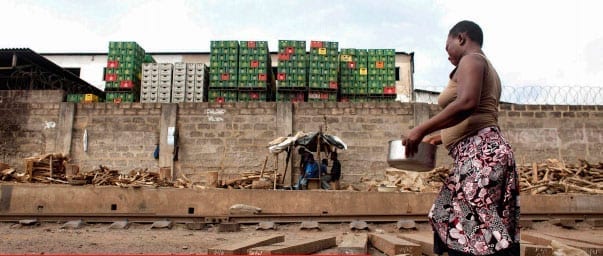
Sep 26, 2017
In the photo, a Ghanaian street vendor sells her wares in front of a massive multinational brewing company.
Guess who pays more in taxes?
The image, an ActionAid photo, shows the inequity of an impoverished vendor paying more in taxes than a major multinational, and makes concrete the reality of illicit financial flows for millions of Africans.
Africa loses at least $50 billion annually, likely much more, through illicit financial outflows, an amount equal to the development assistance it receives each year. Meanwhile, the number of people living on less than $1.25 a day is estimated to have increased from 290 million in 1990 to 414 million in 2010, according to a report commissioned by former South African President Thabo Mbeki. The report defines illicit financial flows as “money illegally earned, transferred or used.” The definition also encompasses the socially undesirable, such as the multinational corporate tax avoidance.
“The problem with IFFs in Africa is that money flows out of Africa and it never flows back,” says Luckystar Miyandazi, policy officer in the African Institutions Program at the European Center for Development Policy Management (ECDPM).
“When illicit financial flows happen, especially in Africa, there is a deficit of taxes,” she says. “Governments find ways of raising this money because they still need money to run, so that means increases in basic goods and services. [Higher] taxes on food, milk and so on affects workers, the community.”
Such regressive tax policies disproportionately harm informal workers and people living in poverty—the majority of whom are women.
Africa Delegation Travels US to Discuss Illegal Financial Flows
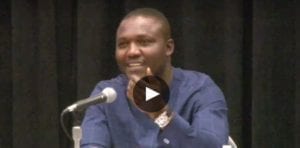
“The nature of investment we see that comes to Africa drives the race to the bottom”—Joel Odigie
Miyandazi is part of a four-person Solidarity Center delegation to the United States this month seeking to shine a light on the massive, yet little recognized crisis of illegal financial flows. The group spoke Monday at a panel on the University of California, Berkeley campus, and at a session sponsored by the Congressional Black Caucus Foundation’s Africa Braintrust in Washington, D.C., on Friday.
“The nature of investment we see that comes to Africa drives the race to the bottom,” says Joel Odigie, a member of the delegation and coordinator of Human and Trade Union Rights at the International Trade Union Confederation-Africa (ITUC-Africa). “There’s an attraction for financial direct investment, and business asks for benefits and concessions,” including lower labor standards, which drives down opportunities for good jobs. The result, says Odigie, is increasing numbers of working poor. (Odigie also spoke on the ITUC’s Radio Labor.)
“Work is on behalf of dignity—if you work, you get out of poverty,” he says. Yet “so many persons are working, breaking their backs, but they’re still in poverty.”
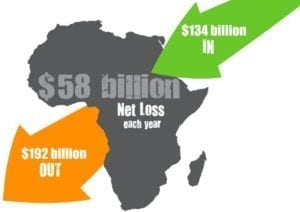 African trade unions and civil society organizations are leading this discussion and have responded with initiatives such as the launch of a transnational movement, Stop the Bleeding Africa, to educate around IFFs and mobilize citizens to advocate for corporate and government accountability.
African trade unions and civil society organizations are leading this discussion and have responded with initiatives such as the launch of a transnational movement, Stop the Bleeding Africa, to educate around IFFs and mobilize citizens to advocate for corporate and government accountability.
“For us the campaign around illicit financial flows is basically trying to make our members understand what the IFF is all about and bringing the message home—how this directly affects workers,” says Caroline Mugalla, executive secretary of the East Africa Trade Union Confederation (EATUC) and a delegation member. (Mugalla also spoke on the ITUC’s Radio Labor.)
Using Tanzania as an example, Mugalla says she points to the $4.8 billion Tanzania loses each year in illegal financial flows, and describes for people how that money could be used to improve the health delivery system and ensure children have access to education.
“Then people get it,” she says.
Going Forward
Mugalla says unions also are connecting with local government leaders to make the connection between the financial outflows and their struggle to provide basic services.
“A community has no water, no paved roads, no electricity—but the nearby mining company has it all,” she says.
When making tax policy, governments “need to take into account the people at the lowest level,” says Miyandazi. “For example, when a government gives a mining contract to a company and it’s going to displace people, governments should put people first and not multinationals.
The bottom line, says Miyandazi: “When making policy on Africa, Africa should be sitting at the table, part of the people who inform this policy and not be done by other people who think things should be done for Africa,” she says.
Gyekye Tanoh, team leader of the Policy Economy Unit at Third World Network Africa, also is taking part in the delegation.
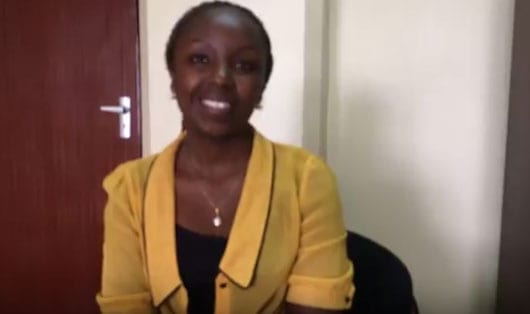
Aug 24, 2017
As a young woman working in her company’s IT department, Jayne Muthoni Njoki was frustrated by what she says were employer attempts to push her around because of her youth and sex. But rather than quit her job, which she contemplated, she ran for a leadership position in her union, determined to work with others to make change on the job—and in society.
“I needed to fight for people whose voice can’t be heard,” she says.
Now 31, Njoki is the only young person in elected leadership in the Central Organization of Trade Unions–Kenya (COTU-Kenya), a Solidarity Center partner, and also president of the International Trade Union Confederation (ITUC)-Africa Young Workers Committee.
Njoki discussed how she is working through unions in Kenya and around Africa to educate and train young workers, especially young women, this week on the Working Life podcast, hosted by Jonathan Tasini (Njoki’s interview starts at 30:02).
Many Young Workers Work in Jobs that Don’t Pay Enough to Get by
With 71 million young people around the world unable to secure employment and 156 million more working poor because they have unstable income in the informal economy, the lack of jobs that pay living wages “is a global issue,” she says.
“We need to now think of the informal sector. When I talk of informal economy, that’s where you see the majority of young people are based.
“But unfortunately, we don’t think the informal sector is part of the economy.” Enabling informal-economy workers to have a voice through unions and associations is key to advancing their rights as workers—and once the informal economy is organized, “then everything will fall into place,” she says.
Through COTU-Kenya, which she says has encouraged young workers and women to become union leaders, Njoki also is working to create awareness among domestic workers about their rights and advance their efforts to become union leaders. Many are sexually harassed and assaulted, and fearful of speaking out about their treatment, she says.
Women workers and even women leaders “can’t come out because they are afraid, they are threatened. It’s not easy to come out and say ‘this is my right [to not experience gender-based violence on the job]’ as a young person, as a young lady.”
As she takes on the challenges facing young workers, Njoki is optimistic about the future. “So many ladies, even young people and young men, they are ready to listen and they are ready to work together so we can drive the agenda together.”
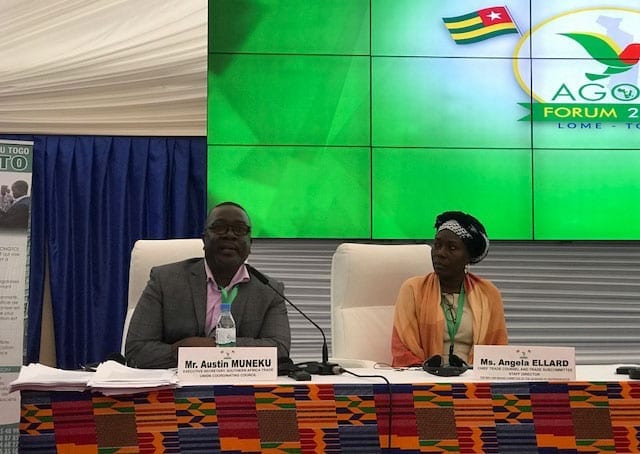
Aug 15, 2017
Meeting in Togo for the annual African Growth and Opportunity Act (AGOA) forum this month, nearly 20 leaders from key African trade unions joined forces to advance the creation of good jobs and safe workplaces through fair trade.
The forum “is a venue for workers to have their voices heard by officials and politicians all over the world,” says Eliamane Diouf, secretary-general of the Confederation of Free Trade Unions of Senegal (CSA), who attended the conference.
It offers unions the opportunity to “make sure companies comply with international standards of labor by complying with the rights of workers,” he says.
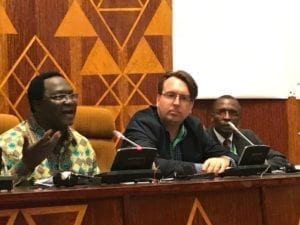
“Fair trade is where everybody wins” —Georges Koanda, USTB general secretary Credit: Solidarity Center Emily Williams
Also at the August 7–10 conference, Georges Koanda, general secretary of the Workers Trade Union of Burkina Faso (USTB), says unions seek to “make sure that all the businesses and small- and medium-sized enterprises that work with AGOA create decent work.
“To me, fair trade is where everybody wins—the worker wins, the employer wins, the government wins and the public around the world wins,” Koanda says. “But to achieve this, the government has to put up a lot of measures and procedures so as to comply with the norms in their trade with the United States.”
The CSA and USTB were among nine Solidarity Center partners at the event, where union leaders released a statement outlining how AGOA should best achieve fair trade for workers and their communities. The first goal is “strict adherence to international labor standards, respect for human rights, democracy and the rule of law,” as “integral performance benchmarks without exception to all AGOA investments and business practice.”
Signed into law in 2000, AGOA was originally an eight-year trade preferences pact providing sub-Saharan African countries that met certain criteria with access to the U.S. market for goods such as clothing, agricultural products and auto components. It has since been extended to 2025. AGOA’s goals involve encouraging economic growth and development as well as regional and global integration of sub-Saharan Africa.
AGOA Provisions for Worker Rights Hold Countries Accountable
Crucially, the pact includes key worker and human rights protections that countries must meet to enjoy AGOA benefits. In 2014, the United States suspended Swaziland from AGOA for failing to allow worker and civil society groups to freely associate and assemble. The Swazi government’s attacks against workers and their unions have since decreased, says Muzikayise Mhlanga, Deputy Secretary General of the Trade Union Congress of Swaziland (TUCOSWA).
“Even though we are not where we want to be in terms of rights, human rights, political rights … I think in terms of the labor component, we are improving. Through the suspension of AGOA, our labor laws have been amended, the suppression of terrorism act also has been amended, the public order act … also has been amended,” all for the better.
The action shows governments “if you don’t adhere to the benchmarks you’re going to lose AGOA,” says Mhlanga.
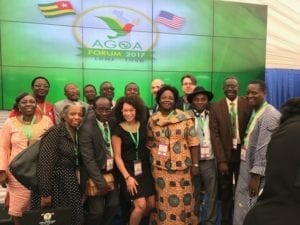
Nearly 20 leaders from key Africa trade unions, all Solidarity Center partners, took part in AGOA 2017 in Togo.
In fact, everyone along the supply chain benefits when workers have decent wages and working conditions and the freedom to form unions and associations, says Koanda.
“When we look at the number of Africans in the supply chain, we realize that these workers and their rights are not respected because they can’t make a living in this value chain. In this case, AGOA is very, very important because AGOA has requirements that our countries have to comply with.”
The unions roundly support AGOA, saying in their statement that it “offers an opportunity for African countries to address the decent work deficit, especially for women, youth and migrant workers as well as reduce poverty and inequalities.”
But the key, says Mhlanga, is decent work—employment that provides living wages in workplaces that are safe and healthy, with fairness on the job and social protections for workers when they are sick, injured or retire.
“We should not compromise the conditions of service just for the sake of getting jobs,” he says. “They should be decent jobs.”
Emily Williams, Solidarity Center senior program officer for Africa, conducted interviews for this report.
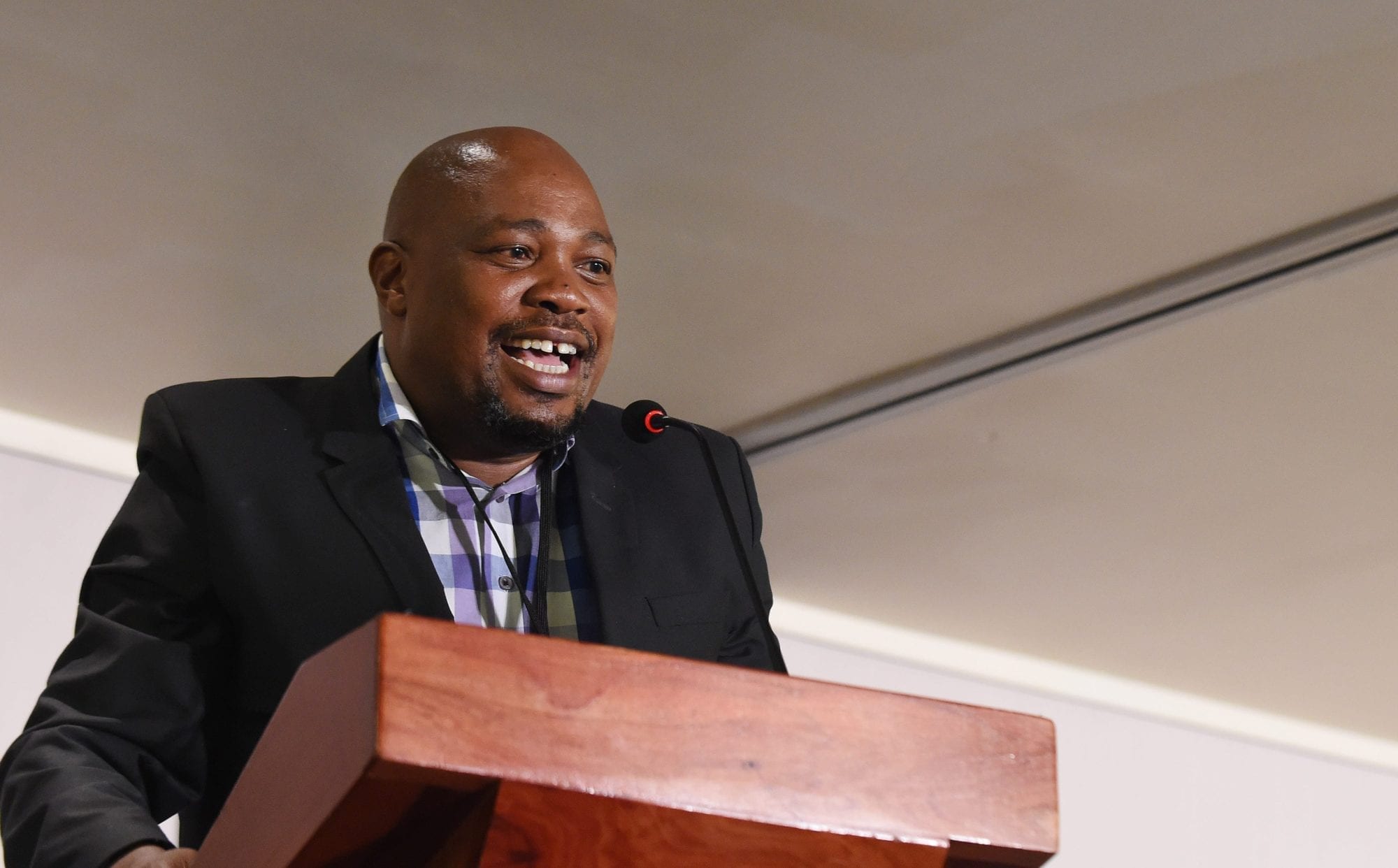
Jan 25, 2017
An estimated 998,000 African migrants entered South Africa between 2011 and 2015, says Mondli Hlatshwayo, coordinator with the Center for Education Rights and Transformation at the University of Johannesburg, where he researches community and trade union education, especially strengthening and building grassroots social justice formations.
But although labor migration from Africa has historically been a male-dominated phenomenon, the pattern has changed significantly in recent decades.
“African women are leaving their countries of birth to create new lives elsewhere. Economic opportunities are primarily available in child care,” and domestic work, he says.
Speaking this morning at the first day of the Solidarity Center conference on fair labor migration, Hlatshwayo provided a detailed overview of migration flows in southern Africa, especially what he describes as the “feminization of migration,” a key focus of the January 25–27 conference’s opening day.
Nearly half of all migrant workers are women, with the feminization of migration increasing in Africa over the past few decades as women seek to support their families. Yet “the situation is worse for women immigrants” who face exploitation based on their sex, he says.
Hlatshwayo described the experience of Pamela Khumalo, a woman migrant worker working in South Africa’s early childhood development sector, who described both her struggle and her courage:
“We have to persevere. Resilience keeps us going. We have to survive against all odds and that has to do with the fact that there are no job and economic opportunities in Zimbabwe. We survive violence on the way to South Africa, because we are looking for work.”
Read Hlatshwayo’s full presentation here.
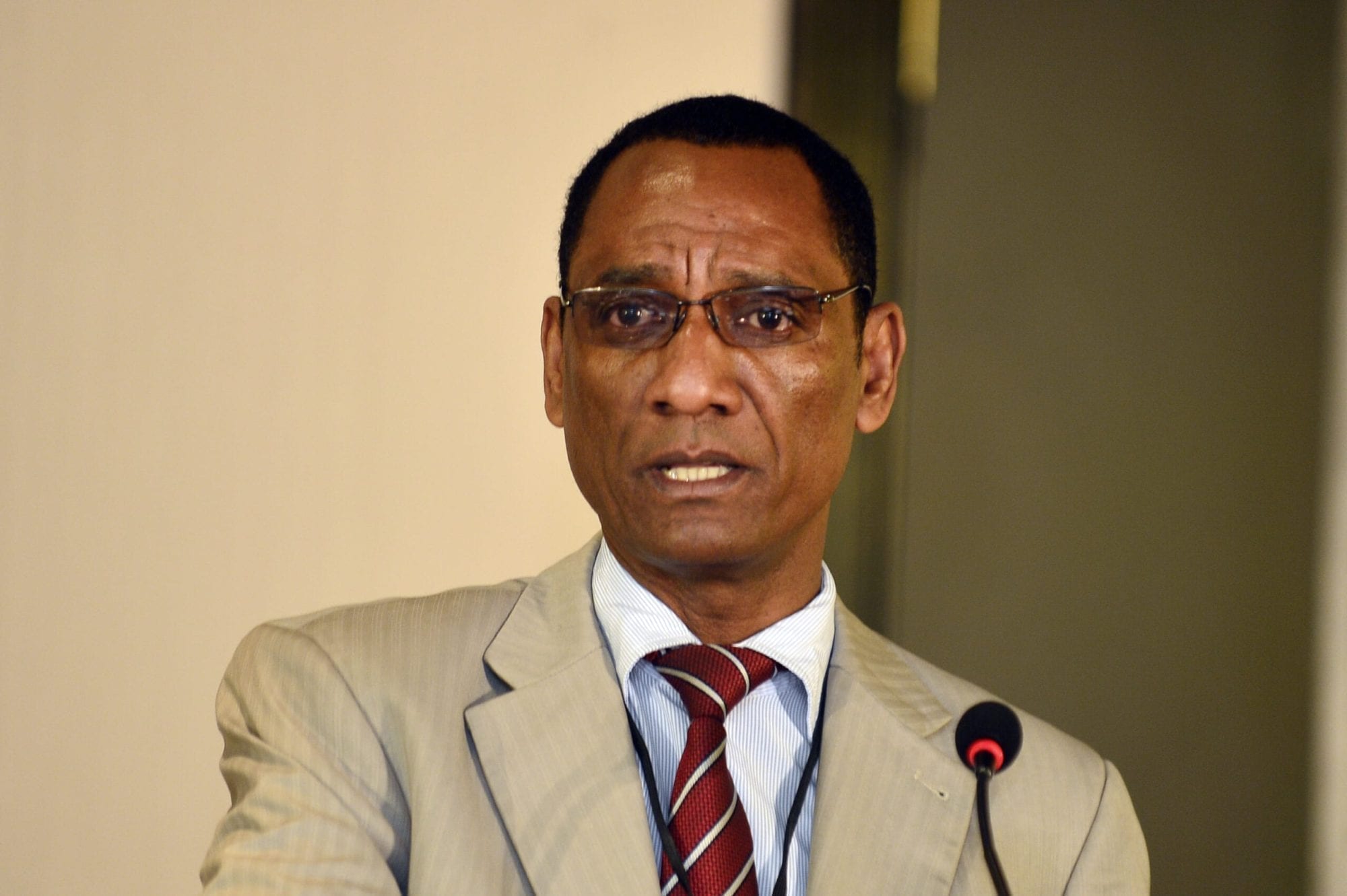
Jan 25, 2017
The respect and dignity of labor migrants is under increasing threat, says Kassahun Follo, first vice president, International Trade Union Confederation-Africa, as migrant workers are demonized and denied basic rights, actions driven by exploitation, racism and xenophobia.
Follo spoke this morning at the opening of the January 25–27 Solidarity Center conference, “Achieving Fair Migration: Roles of African Trade Unions and Their Partners” in Johannesburg, South Africa, where more than 120 union leaders, migrant worker rights advocates and top international human rights officials from nearly two dozen countries and 57 organizations are gathering to share strategies for empowering migrant workers and map out plans for changing policies and laws to provide migrant workers fundamental workplace rights.
(Follow the conference on Twitter with the hashtag FairMigration and check out Solidarity Center on Facebook for regular updates.)
Conference Seeks to ‘Put an End to Employer Abuse of Migrant Workers’
The conference’s opening day focused on the feminization of migration, the varied challenges of migration flows at the region=al level in East, Southern and West Africas, and the global threats of xenophobia and discrimination against migrant, included a discussion with migrant domestic workers.
The conference goal, says Peter Hardie, Solidarity Center country program director, is to “create concrete plans, multilateral and bilateral dialogue to drive change to put a permanent end to the abuses of migrant workers by their employers.”
Worldwide, some 150 million people have traveled across borders and are right now migrant workers in another country and send home global remittances totaling $601 billion dollars. In Africa, 34 million workers are migrants — the majority moving across borders to search for decent work. Half of migrant workers are women, who are especially targeted for abuse and exploitation, often due to their marginalization in the informal economy.
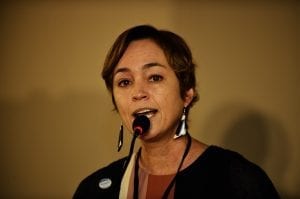
“Making sure working people have the right to form trade unions is the heart and soul of our work,” Credit: Solidarity Center/Evidence Holdings
Although labor migration fuels the world economy, it takes place in a global economy set up entirely on the belief that the free movement of capital and profit across borders is desirable, even sacrosanct; and that lack of regulation is what is needed to make this happen.
“Yet there has been no commensurate systemic expansion of the rights of the working people to go along with the incredible expansion of the rights of business. In fact, the opposite has occurred,” says Solidarity Center Executive Director Shawna Bader Blau, speaking during the conference opening plenary.
Bader-Blau urged participants to build national, cross-border and global coalitions to advance human rights in trade agreements and regional economic integration programs, work harder together to end the double standard of investor rights over worker rights and hold governments accountable to the creation of decent work at home “so migration is truly a choice.”
“Making sure working people have the right to form trade unions is the heart and soul of our work,” says Bader-Blau. The conference must look at how unions “make sure migrant workers have these rights.”
Read Bader-Blau’s full speech here.


 African trade unions and civil society organizations are leading this discussion and have responded with initiatives such as the launch of a transnational movement, Stop the Bleeding Africa, to educate around IFFs and mobilize citizens to advocate for corporate and government accountability.
African trade unions and civil society organizations are leading this discussion and have responded with initiatives such as the launch of a transnational movement, Stop the Bleeding Africa, to educate around IFFs and mobilize citizens to advocate for corporate and government accountability.






